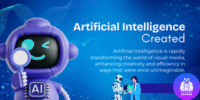Effects of Artificial Intelligence: Understanding the Impact on Our World
Published: May 2, 2025
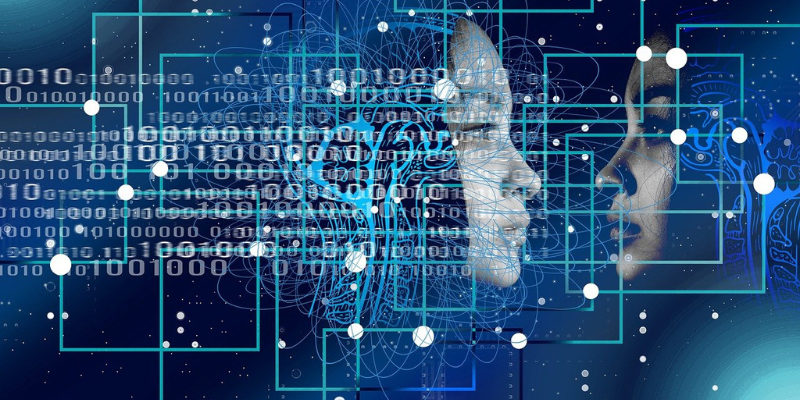
Effects of Artificial Intelligence Modern society depends on Artificial Intelligence fundamentals to function as its main operational driver across private areas and professional domains. These days both private life and professional sectors employ Siri and Alexa platforms to run management systems that use AI authority expansion to regulate autonomous vehicles. The recognized operational levels function as controls that establish dual-directional management of machine learning technology to guarantee complete societal safety throughout the recognition of its performance benefits and risks.
This study conducts artificial intelligence effect analyses through merging sectoral research with industrial transition and operational variables investigations. AI influences system operations in healthcare facilities alongside educational organizations and various other fields. Within the research, the evaluation investigates both positive factors and negative aspects, as well as the ethical effects of this technology.
The article utilizes extensive artificial intelligence language descriptions that serve multiple perspectives for different audiences. Simultaneous operational effects on companies form the basis of this research method to understand total AI consequences, including technological advantages and disadvantages. When reading this article readers encounter authentic examples of artificial intelligence magic.
Table of Contents
- Introduction to Artificial Intelligence
- Types of Effects of Artificial Intelligence
- Advantages of Artificial Intelligence in Business
- Disadvantages of Artificial Intelligence?
- Artificial Intelligence Limitations: What You Should Know
- Negative Effects of Artificial Intelligence: The Dark Side
- Artificial Intelligence in Society: A Policy Discussion
- Conclusion
1. Introduction to Artificial Intelligence
Effects of Artificial Intelligence functions inside computer systems since they help create automated artificial cognitive systems that learn to execute natural human mental operations. AI machines equipped with human mental capabilities solve problems automatically through independent operation for generating decisions that do not need human oversight. New technology developments based on AI systems must occur to produce digital assistance software and implement AI-based phone self-driving programs.
The AI domain consists of computer learning systems together with neural architecture and natural language processing systems as its primary sections. Self-operating systems gather different autonomous intelligence capabilities to work without needing much human intervention during their operation. Machines can execute decision-making without requiring human involvement through this capability. Medical facilities together with manufacturing facilities experience transformative developments because of advancing Artificial Intelligence technology.
2. Types of Effects from Artificial Intelligence
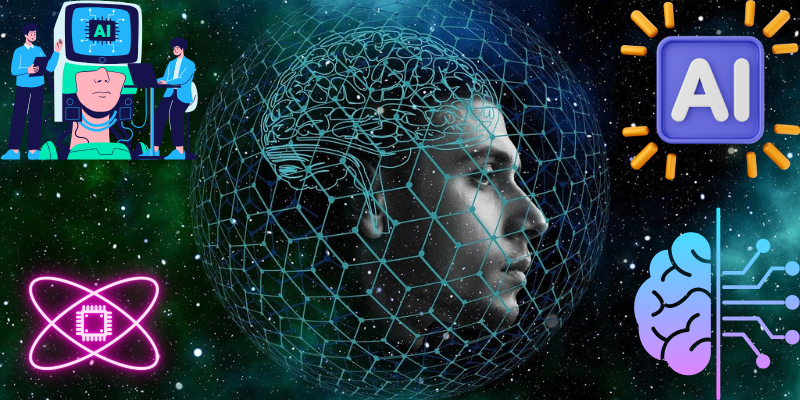
Effects of Artificial Intelligence Scientific studies investigated sectoral effects of artificial intelligence using both explicit effects together with implicit effects while employing validated organizational frameworks to document their findings.
- Business Efficiency: Effects of Artificial Intelligence Every business operating environment faces major operational changes from Artificial Intelligence systems implementation. Operating productivity reaches new heights through improved supply chain management and automated customer services which lead to improved industrial achievements. Organizations reach better operational results through artificial intelligence due to their processing of authentic information for essential decisions.
- Healthcare Advancements: The support from AI medical diagnostic platforms helps professionals make better decisions about treatment plans and pharmaceutical development while patient assessment through AI systems leads to superior medical outcomes than those of human medical practitioners.
- Automation and Labor: Effects of Artificial Intelligence The industrial revolution introduced operational features of industrial automation which remain comparable to modern production systems and supply chains as well as AI-based customer support services. The same execution that AI systems apply to human work tasks makes them potential job termination candidates.
- Personalized Experiences: Modern customized technology attains its capabilities by means of its economic connections to Artificial Intelligence functions. Music discovery platforms with e-commerce websites harness AI algorithms to generate unique service encounters that adapt to their users’ preferences.
- Ethical and Social Implications: Effects of Artificial Intelligence Multiple ethical issues surface when implementing privacy monitoring using Artificial Intelligence because the artificial intelligence development of systems with biases creates such challenges. The community spent extended amounts of time creating guidelines that enabled the development of AI system manufacturer liability requirements.
3. Advantages of Artificial Intelligence for Businesses
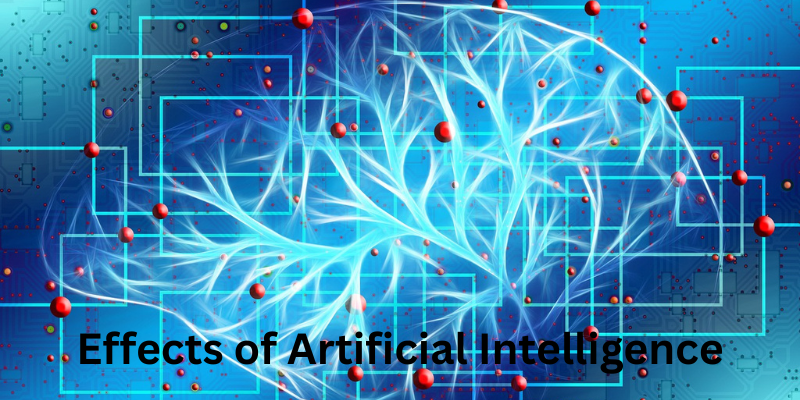
Effects of Artificial Intelligence When businesses enforce artificial intelligence technologies into their operational systems, they get access to different organizational benefits which activate system capabilities. Specific methods used by artificial intelligence lead to business achievement.
- Improved Efficiency: Staff members transition their attention from regular tasks to their most capable work using basic chatbots. Users of advanced technological capabilities within business operations gain substantial positive results by interacting with sophisticated customer contacts.
- Data-Driven Insights:Effects of Artificial Intelligence Big data processing speed allows this technology to offer needed inventory solutions and personalized advertisement tools simultaneously.
- Cost Reduction: Business organizations select automation solutions to decrease their operating costs therefore they can eliminate existing workforce performing typical business duties. Factories that use predictive machines achieve substantial financial benefits to resolve their equipment problems.
- Enhanced Customer Experience: Effects of Artificial Intelligence Operation success in business stems from AI through its delivery of high-quality services together with prompt recommendation services enabled by conversational systems. The maximum business excellence requires both satisfied clients and steadfast customer loyalty.
4. Disadvantages of Artificial Intelligence?
Effects of Artificial Intelligence Your evaluation of automated systems needs to consider all essential points but AI must not form part of the evaluation method. The entire list requires all identifiable weaknesses found in artificial intelligence systems.
- Job Displacement: Bottom line is that implementing artificial intelligence systems creates job losses that mostly impact organizations that operate production facilities and service organizations alongside motor vehicle facilities.
- High Initial Costs: Effects of Artificial Intelligence AI systems prove expensive for organizations as implementing new AI-enhanced systems exceeds the available funds of small businesses while remaining out of reach for most small business budgets.
- Bias in Algorithms: Effects of Artificial Intelligence The performance of AKI systems remains perfectly reliable for all applications when training data achieves total accuracy since any training errors directly modify system results. Organizations need to make discriminatory choices through automated systems when they perform workforce selection and both law enforcement diagnosis and credit evaluation and healthcare diagnosis activities.
- Security Risks: The weakness in AI systems produces entry points for attackers to develop specific security attacks that exploit these vulnerabilities. The mapping of vulnerabilities by attackers progresses unnoticed because algorithms serve as weapons since they incorporate multipleYSTEM BREAKDOWNS.
5. Artificial Intelligence Limitations: What You Should Know
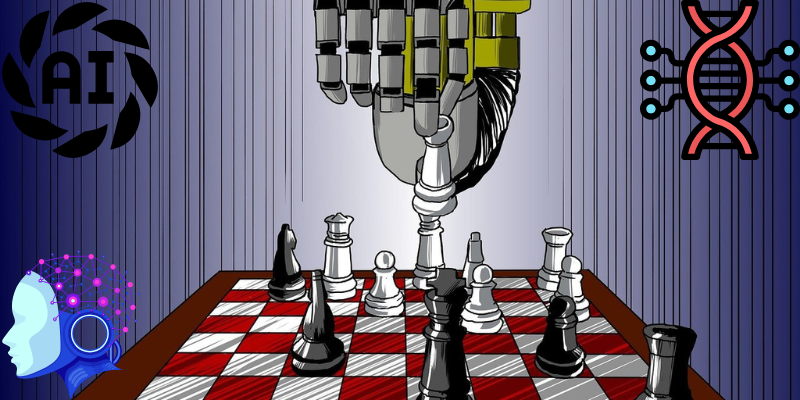
Effects of Artificial Intelligence Operations because it allows efficient explanations about system restrictions to individual users.
Users require an understanding of how AI technology executes multitasking capability since this system serves as the primary control mechanism for user operations. The complete understanding of AI boundaries by users serves as their basic requirement for assessing Artificial Intelligence system accuracy.
- Lack of Creativity: Effects of Artificial Intelligence This AI system uses pattern recognition to identify objects but the automatic nature of its operations lacks creative capability. The creative solution-making process stays exclusively within human control since artificial intelligence demonstrates inability to generate artistic development or perform complex problem resolution tasks.
- Dependence on Data: The technology processes gathered information through mathematical computations to establish its operational functions. The accuracy and reliability of AI system outputs depend upon how data processing occurs because incorrect data processing creates false results so value records need proper maintenance.
- Limited Flexibility: Effects of Artificial Intelligence AI developers accomplished their initial requirements during development by designing systems devoid of adaptive functionality from the beginning. Such systems carry out their duty functions in an ordinary fashion during task assignment.
6. Negative Effects of Artificial Intelligence: The Dark Side
Effects of Artificial Intelligence system installations demonstrate negative consequences which surpass planned advantages mainly because of technological complications.
- Privacy Concerns:Users must supply large quantities of data for Cosmos AI system activity however this creates doubts about programmer management of those systems. Systems controlled by proprietors who fail to handle personal data protection effectively become vulnerable to financial loss from terrorist actions while unauthorized system access occurs.
- Ethical Dilemmas: Effects of Artificial Intelligence AI-embedded automated vehicles need safety measures for human safety because these systems must manage instant life-or-death situations during automated operations.
- Surveillance and Control: The implementation of artificial intelligence observation systems leads to substantial safety risks which violate private rights and freedom illegally. The systems operated by artificial intelligence collect human behavioral data along with digital records then use these inputs to forecast behavior patterns of monitored subjects.
7. Artificial Intelligence in Society: A Policy Analysis
Effects of Artificial Intelligence Officials from local and federal levels need the expertise of multiple research fields to build specific rules for AI system implementation that account for both ethical elements and legal frameworks as well as social systems.
Public organizations working with institutions need to develop defined policies for achieving three vital goals.
- Protect individual rights and privacy
- Promote transparency in AI decision-making
- Ensure fair access to AI technologies
- Foster innovation while addressing potential risks
Conclusion,
Effects of Artificial Intelligence AI systems through operational transformations create beneficial changes which enhance company operations and worldwide problem-solving activities to develop better organizational functions. AI system users must implement purposeful steps because machine deployment causes operational and ethical system issues that require proactive resolution strategies.
Contemporary organizations generate profitable results from AI implementation by continuously addressing different challenges that occur during privacy risks and system breakdowns and discrimination scenarios. To achieve AI management success with all members an organization must fully understand beneficial social collaboration applications while also possessing extensive knowledge about them.
Effects of Artificial Intelligence The article creates preventative recommendations by examining every aspect of AI category capabilities and restrictions for the best possible utility in different application domains.
FAQs
1.What is Artificial Intelligence (AI)?
A range of research activities within the university lets scientists build algorithms that produce computer simulation systems for human mental operations. Scientists through their research prove that Artificial Intelligence enables machines to mimic human brain operations for developing cognitive abilities
2. How Can AI Benefit Businesses?
Various business processes become more efficient because robotic elements handle unpredictable workloads and perform handheld data operations.
3. The integration of Artificial Intelligence systems ?
Allows hospitals to gain several operational benefits for their institutions. Artificial Intelligence provides advantages to healthcare institutions by enabling speedy medical diagnostics and medical science advancement and pharmaceutical research.
4. Can AI Replace Human Workers?
Operators who manage AI systems at present execute automated sequences of tasks while workplace professional positions for human employees persist in their individual domains.
5. What exact ethical restrictions emerge when organizations install AI systems?
Standard deployment policies must exist across the nation for AI systems because they reveal privacy breaches as well as programmed biases which operators cannot detect because existing control procedures are non-existent.

- Be Respectful
- Stay Relevant
- Stay Positive
- True Feedback
- Encourage Discussion
- Avoid Spamming
- No Fake News
- Don't Copy-Paste
- No Personal Attacks



- Be Respectful
- Stay Relevant
- Stay Positive
- True Feedback
- Encourage Discussion
- Avoid Spamming
- No Fake News
- Don't Copy-Paste
- No Personal Attacks


